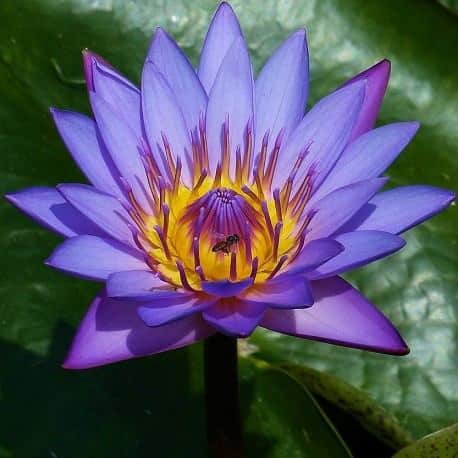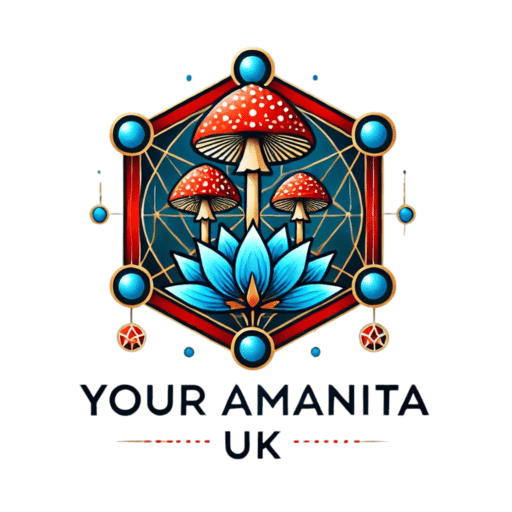
What Is Blue Lotus (Nymphaea Caerulea)
Blue lotus (Nymphaea caerulea), also known as blue Egyptian lotus or blue water lily, is an aquatic plant that mostly grows in Egypt and certain parts of Asia. It contains two alkaloids (apomorphine and nuciferine) that stimulate dopamine receptors (which affect movements, rewards, and emotions in the brain). Some historians have described the use of the blue lotus flower by ancient Egyptians during rituals to achieve a sense of euphoria due to its ability to produce feelings of happiness and calmness. Anecdotal evidence suggests blue lotus has a psychoactive effect similar to a “high” from cannabis.
Apomorphine. A psychoactive compound that acts as a dopamine agonist, meaning it can instill a happy and euphoric feeling. It may also help with muscle control in those with conditions such as Parkinson’s disease and erectile dysfunction. Nuciferine. A compound thought to act as an antipsychotic drug that induces feelings of calmness through mechanisms that aren’t yet fully understood. It has also been shown to improve symptoms of erectile dysfunction.
Blue lotus (Nymphaea caerulea) is indeed not FDA approved for any specific medical or dietary use. It's important to be cautious when using herbal or alternative remedies, as their safety and efficacy may not be well-established through rigorous scientific research and regulatory approval processes. Please consult with a healthcare professional before using any herbal or dietary supplement, especially if you have underlying medical conditions or are taking medications, to ensure it is safe and appropriate for your specific situation. Regulations and information about such substances may have changed since my last update, so it's advisable to check for the latest information from authoritative sources or the FDA.
BLUE LOTUS (NYMPHAEA CAERULEA) HISTORY
Blue Lotus (Nymphaea caerulea), also known as the Sacred Blue Lily of the Nile, holds a rich history deeply intertwined with ancient Egyptian culture and various other civilizations. Here's a brief overview of its history:
*Ancient Egypt*: The blue lotus was highly regarded in ancient Egyptian society, often depicted in their art and hieroglyphics. It held religious and spiritual significance, with the flower symbolizing the sun's journey through the sky and the cycle of rebirth. It was believed to have medicinal and psychoactive properties and was used in various rituals and ceremonies.
*Sacred Symbolism*: The blue lotus represented purity, fertility, and the eternal cycle of life and death. It was associated with the sun god Ra and was used in temple rituals and funerals to help guide the deceased to the afterlife.
*Medicinal and Psychoactive Use*: The blue lotus was also believed to have medicinal properties. It was used to treat various ailments, and its psychoactive effects were utilized in religious and shamanic ceremonies, promoting altered states of consciousness.
*Spread to Other Cultures*: The use of blue lotus extended beyond Egypt. It was mentioned in various ancient texts from different cultures, including the Greeks and Romans. It is also believed to have been used by the ancient Maya civilization in Central America.
*Rediscovery*: The use of blue lotus largely declined over the centuries, and its significance was somewhat forgotten. However, it gained renewed interest in modern times, especially for its reported psychoactive effects. Various herbalists and enthusiasts have explored its potential uses.
*Contemporary Usage*: In contemporary times, blue lotus is sometimes used as an herbal supplement or in herbal smoking blends. It is important to note that its psychoactive properties are still a subject of debate, and scientific research on its effects is limited.
*Conservation*: Due to its historical and cultural significance, blue lotus has faced conservation concerns. Efforts have been made to protect the species from overharvesting and habitat destruction. Overall, the blue lotus has a storied history rooted in ancient Egyptian culture, where it held a prominent place in religious and symbolic contexts. Its legacy continues to intrigue people in the modern world, although its traditional uses and effects remain a topic of exploration and debate.
HOW TO USE IT
How to use it Blue lotus flower can be used in many different forms, though there’s no data available on its safety, maximum dosage, and potency:
• Tea. To make blue flower lotus tea, add one premade tea bag or 3–5 grams of dried flowers to 1–2 cups (250–500 mL) of hot water. Let steep for 5–10 minutes.
• Smoking. If you choose to smoke it, roll dried flowers using rolling papers. Just keep in mind that this method may cause significant psychoactive effects and should be used with caution.
• Vaping. For vaping, finely ground flowers can be added to a vaporizer and inhaled.
• Alcoholic beverage. Some people infuse wine or alcoholic spirits with the flower. Due to the unknown safety of this, it’s best to avoid it.
• Massage and essential oil. You can purchase blue lotus flower massage oil or essential oil which can enter the body through the skin or nasal passage. Though unknown at this time, many claim that these forms are less potent. Despite these uses, it’s unknown if blue lotus toxicity or drug interactions can occur. Don’t exceed the recommended dosage instructions on the product’s packaging. It’s also important to purchase these products from a reliable source and speak with a healthcare provider to make sure it’s right for you.

SAFETY & SIDE EFFECTS
Blue lotus (Nymphaea caerulea) is often used as an herbal remedy and for its potential psychoactive effects. While it is generally considered safe when used in moderation, there can be side effects, including:
*Dizziness:* Some people may experience dizziness after consuming blue lotus.
*Gastrointestinal Issues:* In rare cases, it may cause mild stomach discomfort or digestive issues.
*Sedation:* Blue lotus can have a mild sedative effect, which may cause drowsiness or relaxation.
*Allergic Reactions:* Individuals with allergies to similar plants, like water lilies, might experience allergic reactions.
*Interaction with Medications:* It's important to note that blue lotus may interact with certain medications, so consult with a healthcare professional if you're taking any prescription drugs.
*Pregnancy and Nursing:* Pregnant and nursing women should avoid blue lotus as there isn't enough research on its safety during these periods. Always use caution and moderation when trying herbal remedies, and consult with a healthcare provider if you have any concerns, especially if you're using it for medicinal purposes. It's also essential to ensure that any product you purchase is from a reputable source to minimize the risk of contamination or adulteration.

LAWS AND THE FDA
The legal status of blue lotus (Nymphaea caerulea) varies from country to country and even within different regions of the same country. It's essential to research and understand the specific regulations in your area. As of my last knowledge update in September 2021, here are some general points to consider:
1. United States: Blue lotus is not specifically listed as a controlled substance by the U.S. Drug Enforcement Administration (DEA). However, the FDA does not approve it for any medical or dietary use. State laws may vary, so it's essential to check your state's regulations.
2. United Kingdom: Blue lotus is generally not listed as a controlled substance in the UK, but it's subject to regulations related to herbal medicines and supplements. Always ensure that products comply with these regulations.
3. Other Countries: Legal status can differ significantly from one country to another. Some countries may have specific regulations regarding the sale and use of blue lotus, while others may not. Keep in mind that laws and regulations can change over time, and it's advisable to consult local authorities, regulatory agencies, or legal experts for the most up-to-date information regarding the legal status of blue lotus in your specific location. Additionally, only purchase blue lotus products from reputable sources that comply with local regulations to ensure your safety and compliance with the law.
"Page Disclaimer: The information provided on this page is intended for general guidance and informational purposes only. It should not be considered as professional advice or a substitute for seeking expert assistance. The accuracy, completeness, or applicability of the information may vary depending on individual circumstances, and we do not guarantee its reliability. Users are encouraged to consult with qualified professionals or experts for specific advice or concerns. By using this information, you acknowledge and agree that any reliance on it is at your own risk, and we disclaim any liability for actions taken based on this content."


